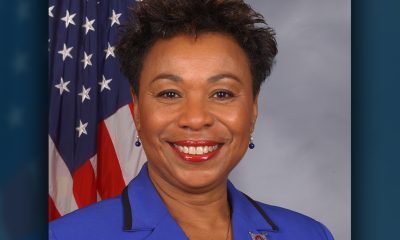Business
Whole Foods: New Chain to be Named for ‘365’ Store Brand

This image provided by Whole Foods shows the logo for 365 by Whole Foods Market, a new chain of smaller stores with lower prices, named after its “365” house brand. Co-CEO Walter Robb says the private-label products will anchor the store, but that it will also have a selection of curated products, including national brand name products. (Whole Foods via AP)
CANDICE CHOI, AP Food Industry Writer
NEW YORK (AP) — Whole Foods says it will name its new chain of smaller stores with lower prices after its “365 Everyday Value” house brand.
Co-CEO Walter Robb tells The Associated Press that the chain will be named “365 by Whole Foods Market,” a nod to the brand already sold by the grocery chain.
He said that while 365 products will anchor the stores, the chain will also have other items, including national brands.
Since announcing plans for the chain in May, recent trademark filings by Whole Foods Markets Inc. had prompted a guessing game that the stores might bear names like Clever Egg, DailyShop, Greenlife, Small Batch or Swiftgoods.
“Those were all decoys,” Robb said in an interview, before quickly adding that his claim could also be a decoy to divert people about other plans.
The new chain, which is slated to begin opening next year, comes as Whole Foods seeks to differentiate itself amid intensifying competition. The company, which has more than 400 Whole Foods stores, has seen its sales growth slow as organic and natural products have become more widely available at mainstream supermarket chains and big-box retailers.
The new chain may also be inspired by the success of companies such as Trader Joe’s and Sprouts, which also focus on value and store-brand products, said Jon Springer, retail editor for the trade publication Supermarket News.
“They’ve identified millennial shoppers, younger shoppers who are very particular about what they eat, but also tough about what they can spend on food,” he said.
Executives in the supermarket and retail industry are also trying to adapt to the changing ways people are shopping. Wal-Mart Stores Inc., for instance, has been opening “Neighborhood Market” stores that are smaller than its supercenters aimed at shoppers who want to get in and out quickly.
A similar philosophy seems to be behind the plan by Whole Foods. In its initial announcement, Whole Foods had said that the new chain would be “geared toward millennials.” But Robb said that while 365 is inspired by younger generations, it’s intended to appeal to anyone who wants a quick, convenient way to shop.
Jeff Turnas, a Whole Foods veteran who was named president of the 365 chain, said he envisions people stopping in at 365 stores during the week when they want to get in and out of stores, with the regular Whole Foods stores being destinations for bigger shopping trips.
Turnas, who previously headed the U.K. business for Whole Foods, also noted that a small Whole Foods location in London has an open-kitchen feel in its prepared food section. Turnas said something similar might pop up in the 365 stores as well.
Whole Foods says it plans to open between five and 10 of the 365 stores around the country next year, and that it sees potential for the chain to eventually have as big a footprint as its namesake chain. The company, based in Austin, Texas, has provided few other concrete details about its plans for the chain.
In an earnings conference call in May, co-CEO John Mackey had described it as a “streamlined, hip, cool technology oriented store, unlike any store anybody has ever seen before.”
When asked this week what 365 stores will look like, Robb remained similarly vague. He asked that people close their eyes and “stay with me on the words and flow” of his description. He then proceeded to ask people to envision a place “that’s fresh, that’s clean” with a smaller, more neighborhood feel, a “streamlined” selection and “technology woven in,” although he declined to say what type of technology that might entail.
But despite the bigger focus on value, Robb stressed the products in the 365 stores will have the same quality standards as “the mothership.”
“It’s not going to be a dumbed-down thing,” he said.
___
Follow Candice Choi at www.twitter.com/candicechoi
Copyright 2015 The Associated Press. All rights reserved. This material may not be published, broadcast, rewritten or redistributed.
Activism
OP-ED: AB 1349 Puts Corporate Power Over Community
Since Ticketmaster and Live Nation merged in 2010, ticket prices have jumped more than 150 percent. Activities that once fit a family’s budget now take significant disposable income that most working families simply don’t have. The problem is compounded by a system that has tilted access toward the wealthy and white-collar workers. If you have a fancy credit card, you get “presale access,” and if you work in an office instead of a warehouse, you might be able to wait in an online queue to buy a ticket. Access now means privilege.

By Bishop Joseph Simmons, Senior Pastor, Greater St. Paul Baptist Church, Oakland
As a pastor, I believe in the power that a sense of community can have on improving people’s lives. Live events are one of the few places where people from different backgrounds and ages can share the same space and experience – where construction workers sit next to lawyers at a concert, and teenagers enjoy a basketball game with their grandparents. Yet, over the past decade, I’ve witnessed these experiences – the concerts, games, and cultural events where we gather – become increasingly unaffordable, and it is a shame.
These moments of connection matter as they form part of the fabric that holds communities together. But that fabric is fraying because of Ticketmaster/Live Nation’s unchecked control over access to live events. Unfortunately, AB 1349 would only further entrench their corporate power over our spaces.
Since Ticketmaster and Live Nation merged in 2010, ticket prices have jumped more than 150 percent. Activities that once fit a family’s budget now take significant disposable income that most working families simply don’t have. The problem is compounded by a system that has tilted access toward the wealthy and white-collar workers. If you have a fancy credit card, you get “presale access,” and if you work in an office instead of a warehouse, you might be able to wait in an online queue to buy a ticket. Access now means privilege.
Power over live events is concentrated in a single corporate entity, and this regime operates without transparency or accountability – much like a dictator. Ticketmaster controls 80 percent of first-sale tickets and nearly a third of resale tickets, but they still want more. More power, more control for Ticketmaster means higher prices and less access for consumers. It’s the agenda they are pushing nationally, with the help of former Trump political operatives, who are quietly trying to undo the antitrust lawsuit launched against Ticketmaster/Live Nation under President Biden’s DOJ.
That’s why I’m deeply concerned about AB 1349 in its current form. Rather than reining in Ticketmaster’s power, the bill risks strengthening it, aligning with Trump. AB 1349 gives Ticketmaster the ability to control a consumer’s ticket forever by granting Ticketmaster’s regime new powers in state law to prevent consumers from reselling or giving away their tickets. It also creates new pathways for Ticketmaster to discriminate and retaliate against consumers who choose to shop around for the best service and fees on resale platforms that aren’t yet controlled by Ticketmaster. These provisions are anti-consumer and anti-democratic.
California has an opportunity to stand with consumers, to demand transparency, and to restore genuine competition in this industry. But that requires legislation developed with input from the community and faith leaders, not proposals backed by the very company causing the harm.
Will our laws reflect fairness, inclusion, and accountability? Or will we let corporate interests tighten their grip on spaces that should belong to everyone? I, for one, support the former and encourage the California Legislature to reject AB 1349 outright or amend it to remove any provisions that expand Ticketmaster’s control. I also urge community members to contact their representatives and advocate for accessible, inclusive live events for all Californians. Let’s work together to ensure these gathering spaces remain open and welcoming to everyone, regardless of income or background.
Activism
Oakland Post: Week of December 31, 2025 – January 6, 2026
The printed Weekly Edition of the Oakland Post: Week of – December 31, 2025 – January 6, 2026

To enlarge your view of this issue, use the slider, magnifying glass icon or full page icon in the lower right corner of the browser window.
Activism
Big God Ministry Gives Away Toys in Marin City
Pastor Hall also gave a message of encouragement to the crowd, thanking Jesus for the “best year of their lives.” He asked each of the children what they wanted to be when they grow up.

By Godfrey Lee
Big God Ministries, pastored by David Hall, gave toys to the children in Marin City on Monday, Dec. 15, on the lawn near the corner of Drake Avenue and Donahue Street.
Pastor Hall also gave a message of encouragement to the crowd, thanking Jesus for the “best year of their lives.” He asked each of the children what they wanted to be when they grew up.
Around 75 parents and children were there to receive the presents, which consisted mainly of Gideon Bibles, Cat in the Hat pillows, Barbie dolls, Tonka trucks, and Lego building sets.
A half dozen volunteers from the Big God Ministry, including Donnie Roary, helped to set up the tables for the toy giveaway. The worship music was sung by Ruby Friedman, Keri Carpenter, and Jake Monaghan, who also played the accordion.
Big God Ministries meets on Sundays at 10 a.m. at the Mill Valley Community Center, 180 Camino Alto, Mill Valley, CA Their phone number is (415) 797-2567.
-

 Bay Area4 weeks ago
Bay Area4 weeks agoPost Salon to Discuss Proposal to Bring Costco to Oakland Community meeting to be held at City Hall, Thursday, Dec. 18
-

 Activism4 weeks ago
Activism4 weeks agoMayor Lee, City Leaders Announce $334 Million Bond Sale for Affordable Housing, Roads, Park Renovations, Libraries and Senior Centers
-

 Activism4 weeks ago
Activism4 weeks agoOakland School Board Grapples with Potential $100 Million Shortfall Next Year
-

 Activism4 weeks ago
Activism4 weeks ago2025 in Review: Seven Questions for Black Women’s Think Tank Founder Kellie Todd Griffin
-

 Arts and Culture4 weeks ago
Arts and Culture4 weeks agoFayeth Gardens Holds 3rd Annual Kwanzaa Celebration at Hayward City Hall on Dec. 28
-

 Advice4 weeks ago
Advice4 weeks agoCOMMENTARY: If You Don’t Want Your ‘Black Card’ Revoked, Watch What You Bring to Holiday Dinners
-

 Activism4 weeks ago
Activism4 weeks agoAnn Lowe: The Quiet Genius of American Couture
-

 Activism3 weeks ago
Activism3 weeks agoDesmond Gumbs — Visionary Founder, Mentor, and Builder of Opportunity





















































